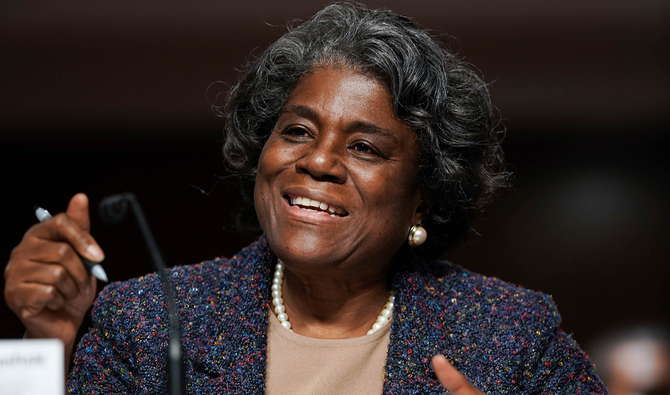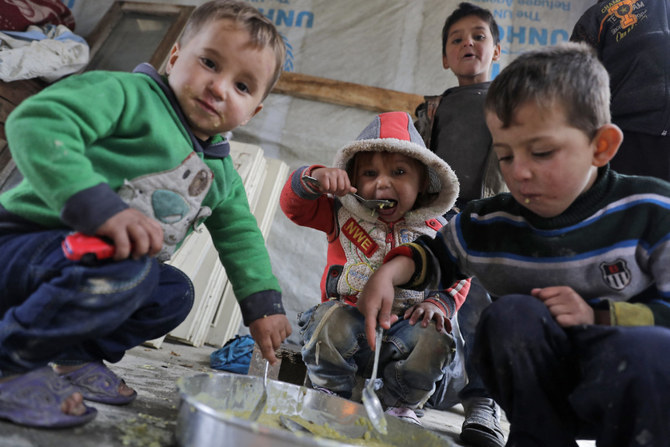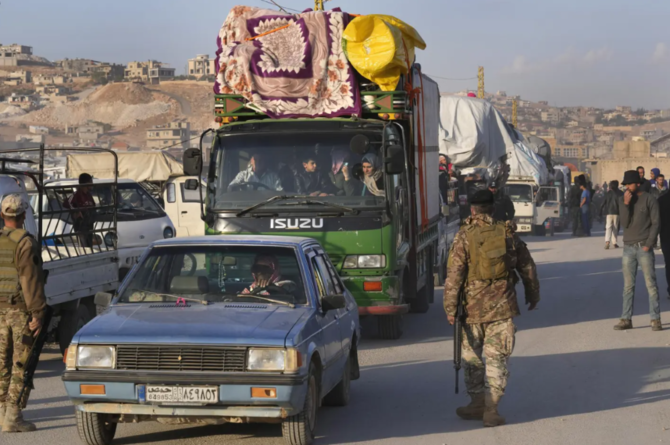NEW YORK: The permanent US representative to the UN, Linda Thomas-Greenfield, on Wednesday accused the Assad regime of blocking the drafting of a new constitution. She also warned that the “so-called May 26 elections (will) be neither free nor fair, and will not be representative of the Syrian people.”
“While the Assad regime run their sham elections, the people of Syria continue to suffer,” she said.
Elections in Syria must be held under the auspices of a new constitution and supervised by the UN, as was mandated unanimously by the Security Council, Thomas-Greenfield said.
“The Assad regime must secure steps to enable the participation of refugees, internally displaced people and the diaspora in any Syrian election,” she added. “Until then we will not be fooled.”
She reiterated that Washington “will not support reconstruction aid that benefits the regime absent progress in achieving the political reforms called for in (Security Council) Resolution 2254.”
She also condemned Assad for “hindering and weaponizing” the delivery of aid supplies. As the humanitarian situation continues to deteriorate, the envoy urged council members to reauthorize the Bab Al-Hawa crossing and reinstate the crossings at Bab Al-Salam and Yaroubiyah, a move that has been vetoed by Russia and China.
“Should the UN lose access to cross-border mechanisms, the COVID crisis in Syria will go from dire to disastrous,” said Thomas-Greenfield.
“Four million people inside northwest Syria depend on the 1,000 UN trucks that use the crossing each month. There is no alternative. Nothing can match the scope and the scale of the UN cross-border humanitarian mechanism. In fact, it’s quite clear that one sole crossing point is insufficient for the vast needs.”
She also highlighted what she described as a “deep moral wrong” that is unfolding in the Rukban refugee camp.
“For 16 months the camp’s residents have been without medical aid because the Assad regime and Russia will not allow the UN to make deliveries to these people in need,” she said.
“We urge the Assad regime and Russia to allow unhindered humanitarian access to the camp. These people are not pawns. Aid cannot be politicized.”
Her Russian counterpart on the Security Council, Vassily Nebenzya, responded by defending the Syrian regime and repeating its rhetoric. He blamed the worsening humanitarian situation on “relentless sanctions pressure exerted by the collective West,” and the deteriorating security situation on “terrorists using civilians as human shields.”
He also welcomed the prospect of next month’s elections as part of the Syrian government’s efforts to “ensure the state is functioning.”
“We lament the fact that some countries are up in arms against the very idea of upcoming elections and are ready declaring them illegitimate,” Nebenzya said. “(The) interference in the internal affairs of the Syrians is unacceptable and contradicts the existing norms of international law.”
He added that “the negative background information on the upcoming elections” has nothing to do with the work of the constitutional committee.
Geir Pedersen, the UN’s special envoy for Syria, reiterated that the elections scheduled for May 26 were called under the auspices of the existing Syrian Constitution, and are not part of the political process established by Security Council Resolution 2254.
“The UN is not involved in this election and has no mandate to be,” he told the council. “Resolution 2254 mandates the UN to facilitate a political process that culminates in the holding of free and fair elections in accordance with a new constitution, administered under United Nations supervision to the highest international standards of transparency and accountability, with all Syrians, including members of the diaspora, eligible to participate.”
He urged council members to prioritize a “proactive search” for a political settlement to the conflict, saying that events in the past month have demonstrated how easily the situation could deteriorate, despite a year of relative calm “by Syrian standards.”
There has been a significant escalation of fighting in northwest Syria, including air strikes on a UN-supported hospital in western Aleppo close to densely populated camps for internally displaced persons, where UN humanitarian aid is delivered. Residential areas in the city have also been shelled.
Meanwhile Daesh continued its assaults in central and northeastern Syria. In one incident dozens of civilians were kidnapped in rural Hama.
“It is all too easy to become immune to these kinds of developments and the dangers they could lead to,” said Pedersen.
He also said that he met with The Syrian Women’s Advisory Board in Geneva this week, and its members voiced fears that “differences among external actors would perpetuate the Syrian conflict.”
“Let us not forget that, in addition to challenges facing all Syrians, many women have also experienced sexual and gender-based violence, early and forced marriage, and trafficking,” he added.
“And with men killed and injured in large numbers, more women than ever are heading households — against the backdrop of violence, terrorism, displacement, instability, destitution and pandemic.”
Pedersen said the women he talked to also stressed the need for progress to be made on the issue of the thousands of people who remain locked up, abducted or missing, as there has been little so far.
“Allow me to stress again the importance of unblocking progress on detainees, abductees and missing persons,” he said.
“As long as this file remains largely frozen, many Syrians will be unable to even begin to think of moving on, and Syria’s social fabric cannot begin to be restored.”
Pedersen also expressed concern about the economic destitution that Syrians face, with food prices at historic highs and no sign of inflation abating.
“12.4 million (people) are now food insecure, an increase of 4.5 million in the past year alone,” he said. “Fuel shortages remain a key concern as well.
“A large-scale, cross-border response for an additional 12 months remains essential to save lives. I appeal for the members of the council to focus on achieving consensus to that end.”






















